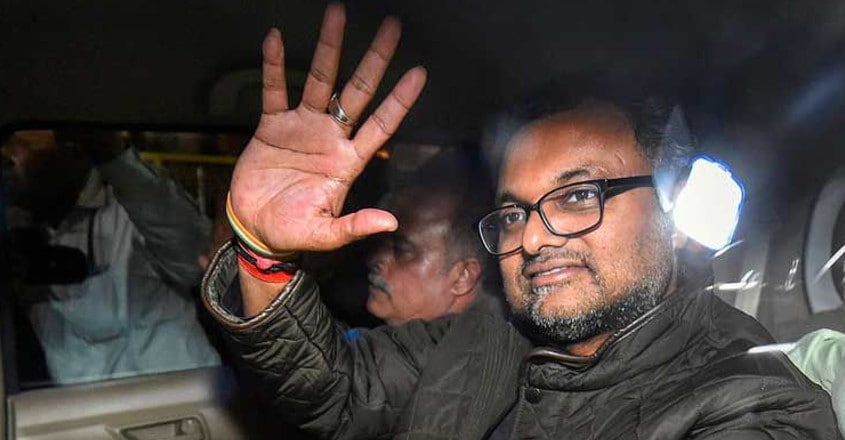SC to reconsider PMLA verdict which upheld ED's powers

Mail This Article
New Delhi: The Supreme Court on Thursday agreed to have a relook at its verdict upholding the Prevention of Money Laundering Act (PMLA) and said "prima facie" the two aspects of not providing an Enforcement Case Information Report (ECIR) and reversal of the presumption of innocence require reconsideration.
The apex court said this as it agreed to hear a plea seeking a review of the judgment that had upheld the Enforcement Directorate's (ED) powers relating to arrest, attachment of property involved in money laundering, search, and seizure under the PMLA. It also issued notice to the Centre.
At the same time, a bench headed by Chief Justice N V Ramana said the object of the PMLA is noble and the offence of money laundering is serious, adding the court is completely in support of prevention of black money and money laundering and that the country cannot afford such types of offences.
The bench, also comprising Justices Dinesh Maheshwari and C T Ravikumar, was hearing a plea filed by Congress MP Karti Chidambaram seeking a review of its July 27 judgement in the PMLA case.
"There is no need for elaborate arguments. We three feel that only two aspects which may be necessary to be re-looked into the judgement," it said.
Referring to the two aspects relating to not providing ECIR to the accused and reversal of the presumption of innocence, the bench said after reading the judgement, "prima facie" it feels that these are the two issues that require reconsideration.
The court also said whatever interim protection was there in the matter, it would be extended by another four weeks and the matter would be listed before an appropriate bench.
In its July 27 verdict, the court had said the supply of a copy of the ECIR in every case is "not mandatory" and it is enough if the ED discloses the grounds of arrest while apprehending an accused.
It observed that an ECIR cannot be equated with the First Information Report (FIR) under the Code of Criminal Procedure (CrPC) in view of the special mechanism envisaged by the PMLA, 2002 and that authorities are "not police officers as such".
On the aspect of reversal of the presumption of innocence, the court had said that when a person is accused of having committed the offence of money laundering, the burden of proving that proceeds of crime are untainted property shall be on the accused.
The judgement was delivered on a batch of over 200 petitions filed by individuals and other entities questioning various provisions of the PMLA, a law which the opposition has often claimed has been weaponised by the Centre to harass its political adversaries.

The verdict had evoked contrasting responses from the BJP and the Congress, with the ruling party hailing it as a "landmark judgement" and its rival expressing concern that it would increase the possibility of the probe agency's "political misuse".
A host of top opposition politicians including Congress leaders Sonia Gandhi, Rahul Gandhi, P Chidambaram, his son and MP Karti Chidambaram, Shiv Sena's Sanjay Raut, National Conference leader Farooq Abdullah, TMC MP and West Bengal Chief Minister Mamata Banerjee's nephew Abhishek Banerjee and Delhi minister Satyendar Jain are among those under the ED's lens for alleged money laundering.
During the court hearing on Thursday, senior advocate Kapil Sibal said he has a lot of submissions to make in the matter.
"We feel these are the two issues which can be re-looked," the bench observed, referring to the two aspects of the judgement that it felt prime facie required reconsideration. "We will issue notice," it said.
Solicitor General Tushar Mehta, appearing for the Centre, said this is not a standalone provision for India and the country is part of a large global structure.
"We are part of a larger global structure and our law will have to be in tune with that larger global structure and that we have explained and the bench had very kindly examined that our law is in tune with not only that structure but our Constitution as well," he added.
"Any deviation would risk India as a nation to be sent back to the other list where we will not be able to get certain financial assistance," Mehta argued, adding there may be global repercussions as well.
The bench told Mehta that the court is not opposing the actions of the government to stop money laundering or bring back the black money or control its circulation as these offences are very serious.
Mehta said the notice should be limited to these two issues which the court has highlighted. He also argued that the review is not maintainable.
The apex court had on Wednesday allowed an application of Karti Chidambaram seeking an open court hearing of his petition to review the verdict.

In his review petition, Chidambaram has said that the verdict has an error apparent and is against the provisions of the Constitution.
In its July 27 verdict, the top court also observed that it is a common experience world over that money laundering can be a "threat" to the good functioning of a financial system, underlining it is not an "ordinary offence".

